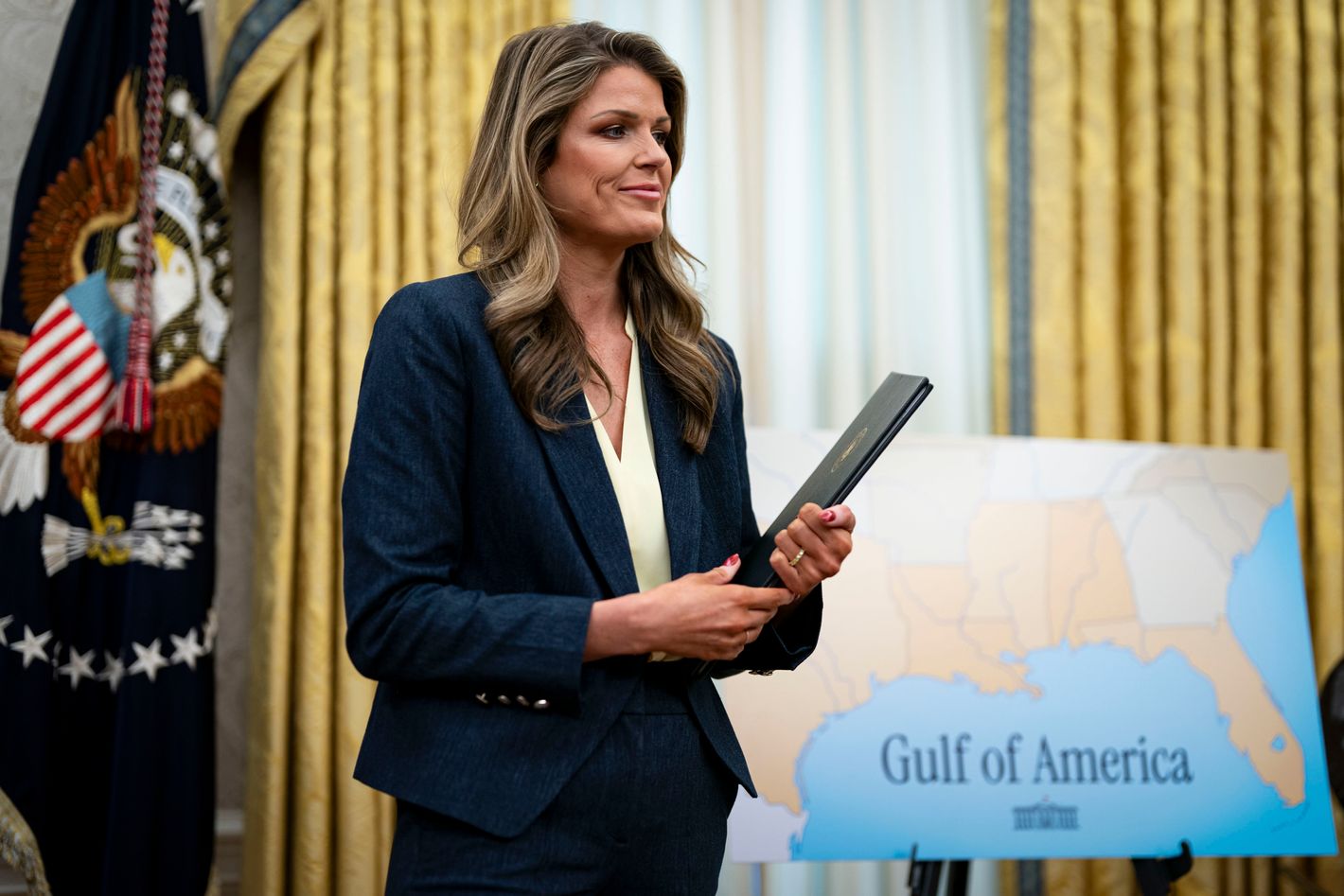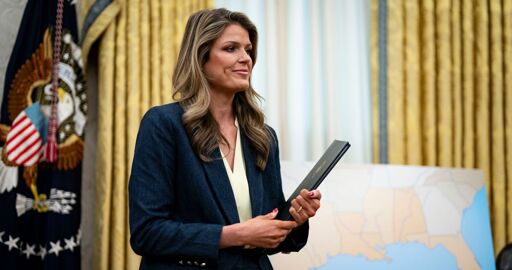
Photo: Al Drago/Bloomberg/Getty Images
Beyond ineptitude and bad faith, one element connecting the Trump administration’s political prosecutions against James Comey and Letitia James is animus. Indeed, the word animus appears dozens of times in Comey’s and James’s respective motions to dismiss their indictments as vindictive and selective, standards reserved for prosecutions that can be explained by nothing else but the government’s hatred of its targets. Because they lack a legitimate official purpose, these kinds of prosecutions tend to be riddled with errors and irregularities, such as the resignation of upstanding government officials who refuse to bring trumped-up charges, the refusal of career attorneys to sign their names to otherwise routine charging documents, and the search for lackeys who may be willing to bring the charges before a grand jury anyway.
Lindsay Halligan, the inexperienced insurance lawyer President Donald Trump handpicked to carry out his campaign of political retribution against two of his highest-profile targets, is not a typical United States attorney that went through Senate confirmation. Instead, under orders from the president, who had already declared on Truth Social that Comey and James were “guilty as hell,” Attorney General Pam Bondi appointed her as interim U.S. Attorney under a law allowing that whenever there is a vacancy. That vacancy was of Trump’s own making, having arisen when the validly appointed U.S. Attorney Erik Seibert resigned, unwilling to prosecute cases he independently determined had little merit. To remove all doubt, once the Comey and James indictments were challenged in court, Bondi attempted to retroactively give Halligan the title of “special attorney,” hoping to cure any defects in the initial appointment.
The gambit didn’t work. Surveying the dizzying timeline of events — which included Halligan’s own bumbling performance before the grand jury in the Comey case — as well as the text and the history of the statute Bondi invoked to appoint her, Judge Cameron McGowan Currie found that the Trump administration violated both federal law and the Constitution in its rush to indict. “I conclude that the Attorney General’s attempt to install Ms. Halligan as Interim U.S. Attorney for the Eastern District of Virginia was invalid and that Ms. Halligan has been unlawfully serving in that role since September 22, 2025.”
As if to anticipate that her ruling may be headed for higher heights, Currie’s back-to-back dismissals of the prosecutions of Comey and James depends heavily on the Supreme Court’s pronouncements regarding the proper appointment of “officers of the United States.” The key language governing these officers is found in the Constitution’s Appointments Clause, which sets out mechanisms for presidential appointments with the advice and consent of the Senate, or else for positions “established by law.” As the judge who invalidated the appointment of U.S. Attorney Alina Habba earlier this year observed, whenever “an appointment violates the Appointments Clause from the jump,” everything that flows from it is likewise void ab initio — illegal from the start.
Save for the facts of each prosecution, the opinions in the Comey and James dismissals are nearly identical; in their core legal analyses, the judge simply switches the defendants’ names but the wording remains the same. Currie seems to be aware that we live in a world where the current Supreme Court considers unlawful appointments of inferior officers an affront to individual liberty; she cites approvingly language to this effect from the likes of Clarence Thomas, Neil Gorsuch, and even Judge Aileen Cannon, who last year dismissed special counsel Jack Smith’s prosecution of Trump over his unlawful retention of classified documents. “There is simply ‘no alternative course to cure the unconstitutional problem’” other than dismissal, Currie writes, quoting language by Cannon, the controversial Trump appointee.
“In light of these principles,” Currie adds, “I conclude that all actions flowing from Ms. Halligan’s defective appointment, including securing and signing Mr. Comey’s indictment, constitute unlawful exercises of executive power and must be set aside.” In reaching her conclusion, Currie worried that an ex post facto ratification of Halligan’s conduct, as Bondi attempted, might lead to an “extraordinary” scenario in which someone wholly unqualified to prosecute offenses against the United States could be tapped for the job in the future, so long as the attorney general signed the correct forms down the road. “It would mean the Government could send any private citizen off the street — attorney or not — into the grand jury room to secure an indictment so long as the Attorney General gives her approval after the fact,” Currie writes. “That cannot be the law.”
Currie dismissed the two prosecutions “without prejudice,” which in the regular course means the Justice Department would be free to refile them once a proper U.S. Attorney is in place. That might work in the case of James, since the allegations of mortgage fraud against her remain within the statute of limitations. But will it work for Comey? As the judge noted, the statute of limitations for his charged offense of making false statements to Congress expired on September 30. Under normal circumstances, a valid indictment would freeze the statute of limitations and could be refiled if dismissed for other reasons. But in a footnote, Currie pointed to language from other courts, though not the Supreme Court, suggesting that when an indictment is invalid, the invalidity “cannot serve to block the door of limitations as it swings closed.”
That may explain why Comey is taking a victory lap, decrying the prosecution as “based on malevolence and incompetence.” And it may explain why White House Press Secretary Karoline Leavitt, speaking to Fox News, said that the Justice Department would appeal its loss rather than attempt to re-indict the former FBI director. “We believe the attorney in this case, Lindsay Halligan, is not only extremely qualified for this position but she was, in fact, legally appointed,” Leavitt said. “And I know the Department of Justice will be appealing this in very short order.” (The department is pursuing a similar appeal in the case of Habba, who is part of a growing list of invalidly appointed U.S. Attorneys who have nonetheless been allowed to remain on the job.)
One piece of unfinished business in Currie’s two decisions is what to do with Comey’s and James’s contention that the prosecutions against them were vindictive and selective. Now that their cases are dismissed, their motions to that effect are effectively moot — that is, Currie cannot grant them because there’s no prosecution left in either case. Unless and until the Justice Department decides to once again seek fresh indictments in these cases — this time by a properly appointed U.S. Attorney — we won’t know for sure how the judge will proceed on that question. But we may get an answer in a different case: Last month, the federal judge handling the political prosecution of Kilmar Ábrego García found that there is a “realistic likelihood of vindictiveness” that entitles his lawyers to seek answers from the government — and maybe even put Deputy Attorney General Todd Blance on the stand to be cross-examined. A hearing in that case is scheduled for next month.
From Intelligencer - Daily News, Politics, Business, and Tech via this RSS feed

